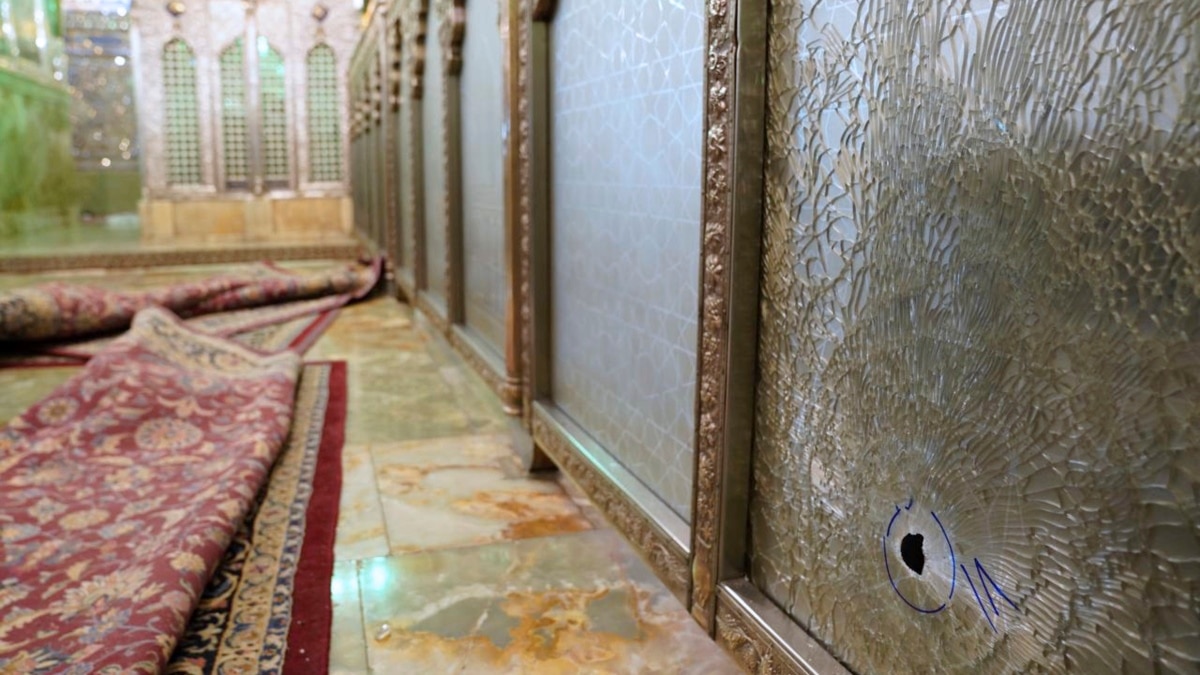Three Condemned To Death For Iranian Mosque Attacks

Table of Contents
Details of the Iranian Mosque Attacks
The Shiraz Attack
The October 26, 2022, attack on the Shah Cheragh shrine in Shiraz, Iran, remains a stark reminder of the brutality of religiously motivated terrorism. This revered Shia mosque, a significant pilgrimage site, was targeted during afternoon prayers. The attack involved a lone gunman wielding a knife and firearm, resulting in a horrifying scene of chaos and bloodshed.
- Number of victims: The attack tragically resulted in the deaths of at least 15 individuals and injured dozens more.
- Details on the perpetrators' motives: While the exact motives remain under investigation, initial reports suggest links to extremist groups opposed to the Shia faith. Further details are still emerging from the ongoing investigation.
- Description of the attack's aftermath: The aftermath was marked by widespread grief, outrage, and a heightened sense of insecurity. The shrine, a symbol of peace and spirituality, was temporarily closed, and security measures were immediately intensified across the country.
- Initial response by Iranian authorities: The Iranian government swiftly condemned the attack, promising to bring the perpetrators to justice. Security forces launched an immediate investigation, and several arrests were made in the following days and weeks.
The Aftermath and International Response
The Shiraz attack drew widespread international condemnation. The brutality of the attack and the targeting of innocent civilians highlighted the global threat of terrorism.
- Statements from UN agencies: The United Nations and other international organizations issued statements condemning the attack and expressing their solidarity with the victims and the people of Iran.
- Responses from neighboring countries: Neighboring countries also condemned the attack, emphasizing the importance of regional cooperation in combating terrorism and extremism.
- Impact on regional stability: The attack raised concerns about regional stability, given the potential for escalating tensions between different religious and political factions.
- Calls for international cooperation in combating terrorism: The event renewed calls for increased international cooperation and information sharing to prevent and counter terrorist threats.
The Condemnation and Death Sentences
The Trial Process
The trial of the individuals accused of involvement in the Shiraz attack proceeded within the Iranian judicial system. Details about the specific procedures are limited, however, reports indicate evidence presented included witness testimonies, forensic evidence, and confessions.
- Key evidence presented in court: Specific details regarding the evidence presented in court have not been widely released publicly, however, the prosecution likely relied upon various types of evidence.
- Defendants' backgrounds and alleged affiliations: Reports suggest links to extremist groups, but concrete details about their affiliations and backgrounds remain under investigation.
- Length of the trial process: While the exact duration isn’t publicly known, the process was likely relatively swift according to Iranian legal norms.
- Any concerns about due process or fair trial guarantees: International human rights organizations and some foreign governments have expressed concerns about the fairness of the trial and the lack of transparency surrounding the proceedings, raising concerns regarding due process guarantees.
Implications of the Death Sentences
The death sentences handed down have sparked debate and international concern. The use of capital punishment raises significant human rights implications, particularly given concerns about the fairness of the trial.
- International legal frameworks concerning the death penalty: Many countries and international organizations oppose the death penalty, viewing it as a violation of fundamental human rights.
- Potential for retaliation or further attacks: There are fears the death sentences might incite further violence or retaliatory attacks from extremist groups.
- Impact on Iran's human rights record: The sentences have drawn criticism from human rights groups who point to concerns regarding the overall human rights record of Iran.
- Calls for clemency or appeals processes: International calls for clemency or appeals processes for the condemned individuals have been made.
Understanding the Broader Context
Religious and Political Tensions
The Iranian mosque attacks occurred within a complex context of religious and political tensions. Understanding this context is crucial for grasping the motivations behind such acts of violence.
- Relevant historical context: A long history of sectarian conflict and political instability in the region provides a background for understanding the current situation.
- Existing sectarian divisions within Iran: While Iran is predominantly Shia, there are Sunni and other minority groups, leading to ongoing societal tensions.
- Role of political ideologies in fueling extremism: Political ideologies and extremist interpretations of religious texts can contribute significantly to the rise of radical groups and acts of terrorism.
Combating Terrorism in Iran
The Iranian government has implemented various measures to combat terrorism, but the challenges remain significant.
- Iranian security measures post-attack: Increased security measures around religious sites and other potential targets were implemented following the attack.
- Effectiveness of counter-terrorism strategies: The effectiveness of Iranian counter-terrorism efforts remains a subject of ongoing debate.
- Challenges faced by Iranian authorities in this area: The challenges include dealing with both domestic and foreign extremist groups, as well as addressing underlying socioeconomic and political grievances.
Conclusion
The Iranian mosque attacks and the subsequent death sentences highlight the tragic consequences of religiously motivated terrorism and raise serious human rights concerns. The events underscore the complexities of regional instability and the urgent need for international cooperation in combating extremism. The severe nature of the attacks and the implications of the death sentences require careful consideration of the underlying causes of such violence. Further research into the Iranian mosque attacks is crucial for understanding this complex issue and fostering a more peaceful future. Stay informed about developments in the aftermath of the Iranian mosque attacks and learn more about the fight against terrorism in Iran.

Featured Posts
-
 Creating A Chateau Atmosphere Diy Projects For Every Room
May 19, 2025
Creating A Chateau Atmosphere Diy Projects For Every Room
May 19, 2025 -
 Pittsburgh Pirates And The Luis Robert Jr Trade A Deep Dive Into Mlb Rumors
May 19, 2025
Pittsburgh Pirates And The Luis Robert Jr Trade A Deep Dive Into Mlb Rumors
May 19, 2025 -
 California Fertility Clinic Bombing Fbi Update On Suspects Fate
May 19, 2025
California Fertility Clinic Bombing Fbi Update On Suspects Fate
May 19, 2025 -
 Succombez Au Salami Au Chocolat Recette Traditionnelle Francaise
May 19, 2025
Succombez Au Salami Au Chocolat Recette Traditionnelle Francaise
May 19, 2025 -
 Luxury Carmakers Face Headwinds In China The Bmw And Porsche Case Study
May 19, 2025
Luxury Carmakers Face Headwinds In China The Bmw And Porsche Case Study
May 19, 2025
